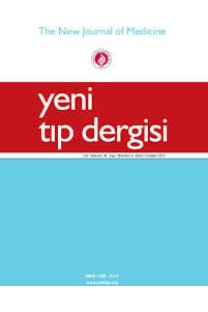Hipertansiyon hastalarının ilaçlarına ve sağlık merkezlerine uyumları
İlaç kullanımı, Hipertansiyon, Antihipertansif ajanlar, İlaç kullanımının gözden geçirilmesi
Adherence of patients to antihypertensive medication and to health care centers
___
- 1. Onat A, Doğan Y, Uyarel H, Ceyhan K, Uzunlar B, Yazıcı M et al. Blood pressure levels in Turkish adults: initial trend to improved blood pressure control. Arch Turk Soc Cardiol 2002;30: 749–57.
- 2. Soydan i. Hipertansiyonla ilgili TEKHARF Çalışması Verileri ve Yorumu, In: Onat A, ed. Oniki Yıllık izleme Deneyimine göre Türk Erişkinlerinde Kalp Sağlığı. ARGOS iletişim Hizmetleri, istanbul 2003;60-71.
- 3. Satman I, Yilmaz T, Sengül A, Salman S, Salman F, Uygur S et al. Population-Based Study of Diabetes and risk characteristics in Turkey. Results of the Turkish Diabetes Epidemiology Study (TURDEP). Diabetes Care 2002;25: 1551-6.
- 4. Altun B, Arici M, Nergizoğlu G, Derici U, Karatan O, Turgan C et al. Prevalence, awareness, treatment and control of hypertension in Turkey (the PatenT study) in 2003. J Hypertens 2005;23:1817-23.
- 5. Ay P, Akici A, Harmancı H. Drug utilization and potentially inappropriate drug use in elderly residents of a community in Istanbul, Turkey. Int J Clin Pharmacol Ther 2005;43:195-202.
- 6. Kulkarni SP, Alexander KP, Lytle B, Heiss G, Peterson ED et al. Long-term adherence with cardiovascular drug regimens. Am Heart J 2006; 151:185-91.
- 7. Chen K, Chiou CF, Plauschinat CA, Frech F, Harper A, Dubois R. Patient satisfaction with antihypertensive therapy. J Hum Hypertens 2005; 19:793-9.
- 8. Abacı A, Kozan O, Oguz A, Sahin M, Deger N, Senocak H et al. Prescribing Pattern Of Antihypertensive Drugs in Primary Care Units in Turkey: Results From The Turksaha Study. Eur J Clin Pharmacol 2007;63: 397–402.
- 9. Fischer MA, Avorn J. Economic implications of evidence-based prescribing for hypertension: can better care cost less? JAMA 2004; 291:1850-6.
- 10. Abaci A. Oguz A, Kozan O, Toprak N, Senocak H, Deger N et al Treatment and control of hypertension in Turkish population: a survey on high blood pressure in primary care (the TURKSAHA study). J Hum Hypertens 2006;20: 355–61.
- 11. Mori H, Ukai H, Yamamoto H, Saitou S, Hirao K, Yamauchi M et al. Current Status of Antihypertensive Prescription and Associated Blood Pressure Control in Japan. Hypertens Res 2006;29: 143–51.
- 12. Clark LT. Improving compliance and increasing control of hypertension: needs of special hypertensive populations. Am Heart J 1991; 121: 664-9.
- 13. Ubel PA, Jepson C, Asch DA. Misperceptions About Beta-Blockers and Diuretics A National Survey of Primary Care Physicians. J Gen Intern Med 2003;18: 977–83.
- 14. Fretheim A, Oxman AD. International variation in prescribing antihypertensive drugs: Its extent and possible explanations. BMC Health Services Research 2005;5: 21.
- 15. Goodman B. Do drug company promotions influence physician behavior ? West J Med 2001;174: 232-3.
- 16. Vancelik S, Beyhun NE, Acemoglu H, Calikoglu O. Impact of pharmaceutical promotion on prescribing decisions of general practitioners in Eastern Turkey. BMC 2007;7:122.
- 17. Xie F, Petitti DB, Chen W. Prescribing patterns for antihypertensive drugs after the Antihypertensive and Lipid-Lowering Treatment to Prevent Heart Attack Trial: report of experience in a health maintenance organization. Am J Hypertens 2005;18: 464-9.
- 18. Roos NP, Carrière KC, Friesen D. Factors influencing the frequency of visits by hypertensive patients to primary care physicians in Winnipeg. Canadian Medical Association 1998; 159: 777.
- 19. Aslam H, Anis, Daphne P. Guh. When patients have to pay a share of drug costs: effects on frequency of physician visits, hospital admissions and filling of prescriptions. CMAJ 2005;22: 173.
- ISSN: 1300-2317
- Yayın Aralığı: Yılda 4 Sayı
- Başlangıç: 2018
- Yayıncı: -
Laparoskopik kolesistektomiye bağlı safra yolları yaralanmalarının endoskopik tedavisi
Celal ÇERÇİ, Altuğ ŞENOL, M. Cem KOÇKAR, Muhammed AKÇAOĞLU, Nihat KAYMAKÇIOĞLI
Serebral palsi ve ileri derecede kifoskolyozu olan çocuk hastada unilateral spinal anestezi
Yaşar PALA, Derya TOPUZ, Vildan TAŞPINAR, Yılmaz APAYDIN, Bayazıt DİKMEN
İlginç lokalizasyonlu bir malign melanom
Zerrin ÖĞRETMEN, Kenan DİBEK, M.Serhat SARI, Murat ERMETE
Hipertansiyon hastalarının ilaçlarına ve sağlık merkezlerine uyumları
Adem ÖZKARA, Faruk TURGUT, Yusuf SELÇOKİ, Mehmet KANBAY, Feridun KARAKURT, Oğuz TEKİN
Üretral yabancı cisimler: Bir olgu
Turgay AKGÜL, Emre HURİ, MURAT BAĞCIOĞLU, Erim ERSOY, Cankon GERMİYANOĞLU
Hipokalsemi ile giden subkutan yağ nekrozu olan bir vaka
DENİZ ANUK İNCE, Ece YAPAKÇI, Aylin TARCAN
Zenker divertikülü: Vaka serisi
Murat AKIN, AHMET ZİYA ANADOL, Osman KURUKAHVECİOĞLU, HASAN BOSTANCI, Ekmel TEZEL, Çağatay ÇİFTER
Eyüp HORASANLI, Burhanettin USTA, Aytekin YEŞİLAY
Bülent SALMAN, MUSTAFA KEREM, TONGUÇ UTKU YILMAZ, Tevfik Tolga ŞAHİN, Abdulkadir BEDİRLİ, Mehmet OĞUZ, Gürsel BİBEROĞLU
